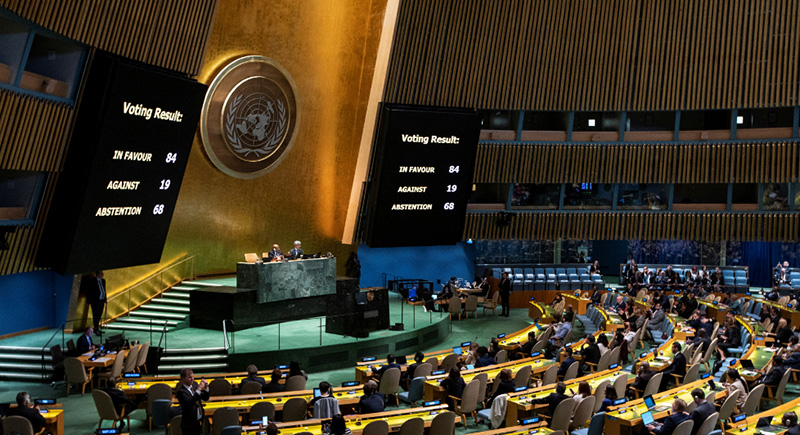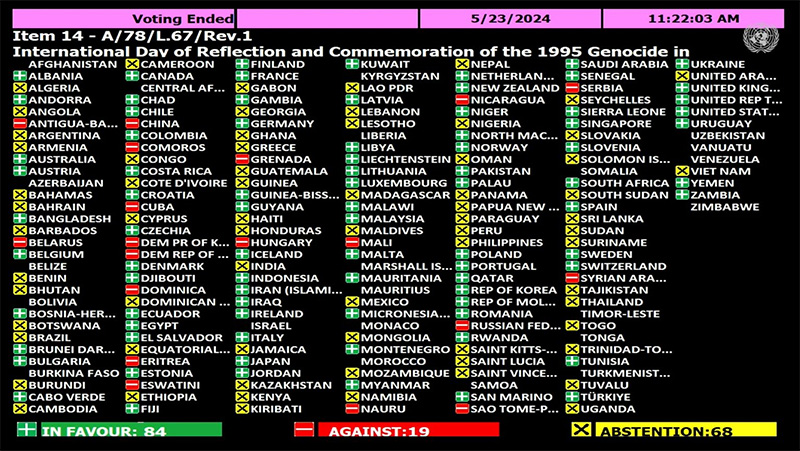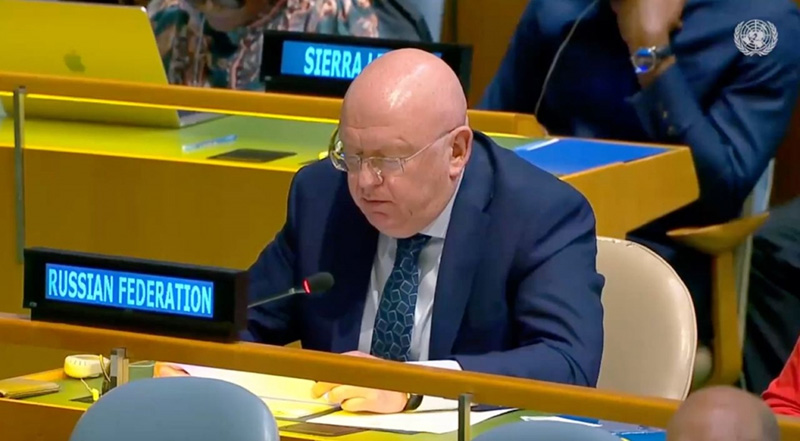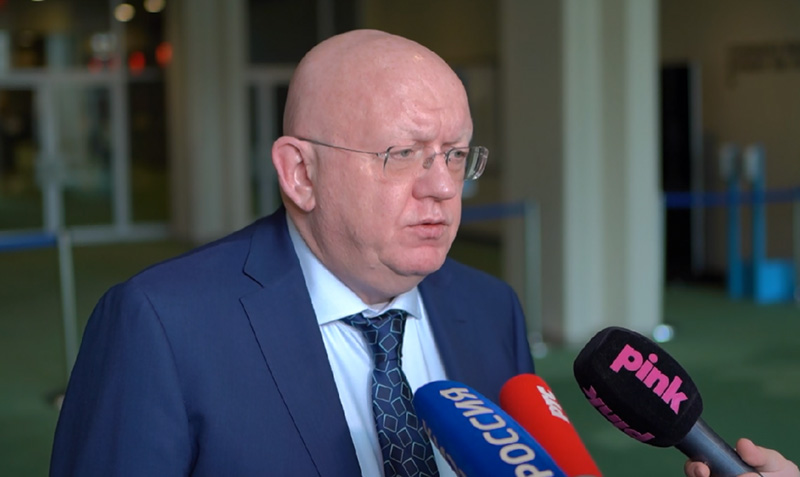 Screens show results of the United Nations General Assembly's vote on the creation of an international day to commemorate the Srebrenica genocide, at the United Nations, May 23, 2024.
Screens show results of the United Nations General Assembly's vote on the creation of an international day to commemorate the Srebrenica genocide, at the United Nations, May 23, 2024.
Photo: Reuters
The United Nations General Assembly on Thursday adopted a resolution establishing an annual International Day of Reflection and Commemoration of the 1995 Genocide on July 11, despite a campaign by Serbia and its allies against the resolution, which they claim demonises Serbs, “Balkan Insight” informs.
Eighty-four countries voted for the resolution and 19 voted against. Another 68 countries abstained, while 22 did not vote.

Three of the five UN Security Council permanent members – the United States, United Kingdom and France – voted in favour of the resolution while the other two, Russia and China, voted against.
Of the Balkan and Central European countries, Serbia and Hungary voted against, Slovakia and Greece abstained, while the rest were in favour.
Serbian President Aleksandar Vucic called the resolution “highly politicised”. He noted that the International Criminal Tribunal for the Former Yugoslavia’s verdicts have already established the personal responsibility of those convicted of Srebrenica crimes.
“This resolution will open Pandora’s Box, you are going to face dozens of this type of resolutions on the genocide issue,” Vucic warned.
The resolution, proposed by Germany and Rwanda and co-sponsored by more than 30 countries, including all former Yugoslav republics except Serbia and Montenegro, designate 11 July as “the International Day of Reflection and Commemoration of the 1995 Genocide in Srebrenica, to be observed annually”.
 Photo: Permanent Mission of the Russian Federation to the United Nations
Photo: Permanent Mission of the Russian Federation to the United Nations
Explanation of vote by Permanent Representative Vassily Nebenzia (photo) after UNGA vote on a draft resolution on Srebrenica. Main points:
- Today we saw a sad page in the history of the UN General Assembly. A Germany-led group of delegations decided to abuse the powers of the General Assembly and adopt, under the guise of a resolution on the establishment of a commemorative day, a political declaration whose purpose is, despite the initiators' claims to the contrary, to demonize one of the peoples of the former Yugoslavia and to undermine the Dayton Peace Agreement and UN Security Council resolution 1031 (1995), which endorsed it. Not surprisingly, the non-consensual resolution that was adopted by the vote, not only fails to call for the full implementation of Dayton, but even does not mention it. The result of the vote was not what the sponsors had expected. Look at the numbers: more UN members did not support the resolution than those who did.
- Among the initiators of the draft was the Permanent Representative of Bosnia and Herzegovina, who acted in excess of his authority in this matter. According to the Constitution of Bosnia and Herzegovina, which is part of the Dayton Agreement, before being put forward, this resolution should have been approved by all members of the Presidency of BiH.
- This is yet another confirmation of the consistent policy of some Bosnian elites and their Western sponsors towards undermining the role of the Presidency as the supreme voice of the consensus position of the multi-ethnic BiH society on key issues of state importance. Let us recall that the system of balancing the interests of the three constituent peoples and the two entities lies at the heart of the Dayton Peace Agreement, which put an end to the deadly civil war in Yugoslavia.
- The sponsors of the initiative were misleading the members of the General Assembly from the outset. They claimed that the resolution was aimed at reconciliation while concealing that it lacked one essential element, namely the consent of all peoples and entities of Bosnia and Herzegovina. The plain fact that the draft resolution was introduced and discussed stirred up tension in Bosnia and Herzegovina and the Balkans as a whole. This is confirmed by mass demonstrations in Banja Luka, letters and statements by the Serb member of the BiH Presidency, Željka Cvijanović, and Serbian representatives at UNSC meetings on April 30 and May 15. The statement made by the National Assembly of Republika Srpska on 22 May also shows that the issue under discussion today has a legal dimension.
- All calls by responsible UN members, including Russia and Serbia, to return the issue of the Bosnian War memorial day to the national level for discussion by all three constituent peoples of BiH, as well as to achieve a unified position in the region, were rejected. At the same time, the list of co-sponsors includes Germany, the United States, France, Great Britain, Finland, Ireland, Italy, Liechtenstein, and even New Zealand. Even the Netherlands, whose so-called peacekeeping battalion played a shameful role in the Srebrenica tragedy in 1995, has not hesitated to join the list.
- One thing is clear: the initiators of today's decision are acting deliberately, pushing Bosnia and Herzegovina towards a confrontation, without regard for the price it paid during the civil war in the 1990s. The war killed 100,000 people, and saw many bloody tragedies against not only Bosniaks, but also Serbs and Croats. It seems that this is being done so that the BiH peoples never reconcile. We consider these actions as a threat to peace and security in the country and the region as a whole.
- All this is cynical and hypocritical. But what is even more surprising is that the main sponsor of this resolution is Germany. The country that in the 20th century unleashed two world wars, murdered millions of people in concentration camps, was responsible for mass crimes in Africa, and took a very active part in the collapse of Yugoslavia and the bombing of Sarajevo in 1995, is now trying from the podium of the General Assembly to lecture others on the importance of national reconciliation. We are convinced that Germany has no moral right to even mention the term “genocide” in relation to anything other than its own heinous crimes. May I remind that the United Nations, in which walls we are gathered today, was created because of the crimes of Nazi Germany and in order to prevent such crimes against humanity from recurring once and forever.
- With this step, the sponsors of the draft resolution dismissed the status quo, which was based on the General Assembly resolution 69/323 establishing December 9 as the International Day to commemorate the victims of all genocides, and opened a Pandora's box. We must remind that there is no decision of the General Assembly on genocide and other crimes of Nazi Germany against the peoples of the Soviet Union during the Great Patriotic War of 1941-1945. Those crimes claimed 27 million Soviet lives. Many European peoples suffered too, and that includes Serbs who were affected very severely. We have not forgotten that. And we will not forget. No one is forgotten and nothing is forgotten.
- We heard repeatedly that the resolution before us is merely meant to bridge a gap, reaffirm the decisions of international courts and promote long-term national reconciliation. However, the bitter irony is that today's vote clearly showed how divided the international community is on both Srebrenica and the aforementioned decisions. The adoption of this resolution is a Pyrrhic victory for its sponsors. What have they achieved? If the authors aimed to split the General Assembly, which we had warned them about in advance, they succeeded brilliantly.

Remarks to the Press by Permanent Representative Vassily Nebenzia following UNGA vote on the draft resolution on Srebrenica:
Vassily Nebenzia: Speaking of the resolution on the genocide in Srebrenica, proposed by a group of initiators, I must tell you that the result of the voting is really shameful for them. If they wanted to achieve something, they did not. What they achieved is a division in the General Assembly. We warned them in advance that the adoption of the resolution would not be by consensus, that it would not be an easy ride, and that it would divide the UN membership. In fact, more countries did not support the resolution than those who voted in favor. The latter are mainly a well group of countries who vote according to the bloc discipline.
Once again, I must say that unfortunately, this adopted resolution does not achieve the goals that the initiators announced initially. They announced that it would serve the purpose of reconciliation in Bosnia and in the Balkans in general. In fact, it just brought more divisions.
I must recognize and acknowledge the bright and very powerful statement by the President of Serbia, Aleksander Vučić, who made it absolutely clear that he understands what lies behind proposing this draft and adopting it. Again, this is not what the co-sponsors of the resolution had announced. This is clearly political reasons.
Today, a few countries mentioned that events that took place in their countries at different periods of time had been much larger in scale than even the ones that happened in the Balkans, for example in Srebrenica. But those events, tragic for them, their memory, and their national positions, were not recognized as genocide. So we do not exclude that some countries may come up with initiatives to fill this remaining gap. There was a resolution of the General Assembly that decided to mark December 9 every year as a day commemorating all the genocides in history. By adopting the resolution today, that [prior] agreement was basically breached.
I said in my explanation of vote that we had a Nuremberg tribunal, but we didn't have any General Assembly resolution condemning Nazi Germany for the genocide and other war crimes that it had committed during World War II against the peoples of the Soviet Union and, for example, against the Serbs who suffered immensely during those times. So I do not exclude any initiative that may follow today's unfortunate adoption of this resolution.
read more in our Telegram-channel https://t.me/The_International_Affairs

 11:59 24.05.2024 •
11:59 24.05.2024 •






















